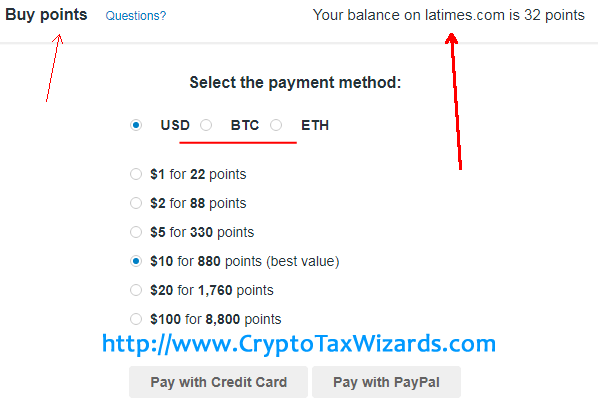IRS and Bitcoin
The taxes you must pay for your bitcoin and bitcoin purchases are lost in a mass of confusion and that is exactlt the way the IRS wants it!
Did you know that the per Internal Revenue Service, bitcoin, Ethereum, Litecoin, Monero… all cryptocurrency investors are liable for tax liabilities when cashing out any cryptocurrency for fiat (US dollars for example).
And – surprise, surprise – ANYTHING purchased via bitcoin and all the other digital currencies is taxable; as a capital gain — including the purchase of other cryptocurrencies!
When you sell one coin and buy another, you owe the IRS! That’s a taxable event. Shock and Awe? The IRS way…
Purchases of physical goods using cryptocurrenceies are a taxable event as well according to the IRS. Cryptocurrencies such as BTC, BCH, ETH… are considered “real property” by the IRS and thus are taxable!
And again, when you exchange one coin for another, you are exchanging one property for another. Thus, YOU OWE THE IRS MONEY!
 Regarding IRS 1099 forms? You may receive one if you do business with the exchange Coinbase. They were forced by the IRS to begin issuing them to Coinbase customers for the tax year 2016.
Regarding IRS 1099 forms? You may receive one if you do business with the exchange Coinbase. They were forced by the IRS to begin issuing them to Coinbase customers for the tax year 2016.
Finally, when investors in crypto assets sell cryptocurrencies and hold them for 365 days+, long-term capital gains are reported with the caveat that losses are not deductible against future tax years.
And most importantly, people don’t understand that if you’re holding Bitcoin (HODL), you’re not taxed.
What do you think of the cryto tax treatment by the IRS?
Are you constantly “looking over your shoulder” worried the IRS may come knocking on your door in regards to your bitcoin investments?
Need help? Counsel? Advice? Reach out TODAY for a free consultation: Team@CryptoTaxWizards.com
IR-2014-36, March. 25, 2014
The Internal Revenue Service issued a notice providing answers to frequently asked questions (FAQs) on virtual currency, such as bitcoin. These FAQs provide basic information on the U.S. federal tax implications of transactions in, or transactions that use, virtual currency.
In some environments, virtual currency operates like “real” currency — i.e., the coin and paper money of the United States or of any other country that is designated as legal tender, circulates, and is customarily used and accepted as a medium of exchange in the country of issuance — but it does not have legal tender status in any jurisdiction.
The notice provides that virtual currency is treated as property for U.S. federal tax purposes. General tax principles that apply to property transactions apply to transactions using virtual currency. Among other things, this means that:
- Wages paid to employees using virtual currency are taxable to the employee, must be reported by an employer on a Form W-2, and are subject to federal income tax withholding and payroll taxes.
- Payments using virtual currency made to independent contractors and other service providers are taxable and self-employment tax rules generally apply. Normally, payers must issue Form 1099.
- The character of gain or loss from the sale or exchange of virtual currency depends on whether the virtual currency is a capital asset in the hands of the taxpayer.
- A payment made using virtual currency is subject to information reporting to the same extent as any other payment made in property.
Further details, including a set of 16 questions and answers, are in Notice 2014-21, posted today on IRS.gov.
IRS-Bitcoin-CryptoCurrency-Notice-n-14-21Bitcoin and IRS








